


06/05/2017
A cold civil war has been raging within academe, a war between “Biologians” and “Culturists.” Recently the war has been getting hotter: Biologians are actually being suppressed, not debated, by Culturalists. Case in point: My own recent experience after publishing my eleventh article with American Historical Review,
Perspective: Many modern biologists, genomic scientists, and physical anthropologists are Biologians. They think evolutionary adaptations are partly responsible for some racial disparities. But most historians, social scientists, public leaders, and Main Stream Media journalists are culturists. They minimize the importance of biology and evolution and say that history and culture explain the variations in the distribution of human characteristics.
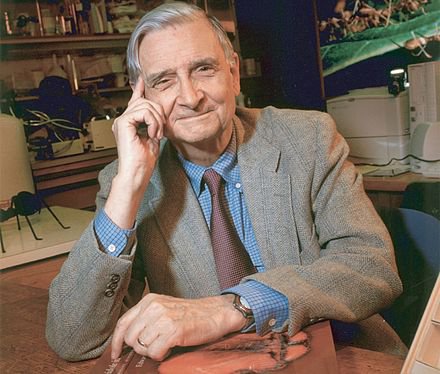
One of the landmark events in this academic civil war occurred in 1975, when E. O. Wilson (right) a biology professor at Harvard, published Sociobiology: The New Synthesis.In this book, Professor Wilson presented a mountain of evidence to establish that biology influenced many forms of social behavior in the animal kingdom.
Then, in the last chapter of the book, Professor Wilson maintained that this was also true for human beings.
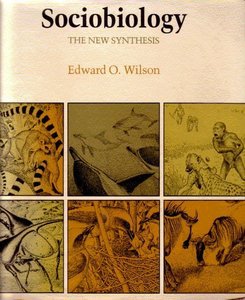
Among biologists, the initial reaction to Sociobiology was overwhelmingly favorable. The response of many historians and social scientists, however, was quite critical. This was not surprising, for most historians and social scientists regard human nature as relatively unstructured, as something that is shaped by social forces. Some scholars, especially those with Marxist beliefs, have emphasized the special importance of economic forces that are extraneous to human biology.
As it happened, a Marxist group at Harvard, Science for the People, responded to Sociobiology with printed leaflets and teach-ins that were harshly critical of Professor Wilson. For a few days, a protester in Harvard Square used a bullhorn to demand that the university fire Professor Wilson, and on one occasion two students invaded the professor’s class on evolutionary biology to shout slogans and deliver anti-sociobiology monologues.
To make matters worse, Professor Wilson received little support from his colleagues on the Harvard faculty. To avoid embarrassment, he stayed away from department meetings for an entire year.
Professor Wilson considered offers to move to other universities, but he decided to stay at Harvard. “The pressure was tolerable,” he has written, “since I was a senior professor with tenure … and could not bear to leave Harvard’s ant collection, the world’s largest and best.” [What is Sociobiology?,Edward O. Wilson, 1978]
The opposition reached something of a climax in 1979, when Professor Wilson was scheduled to speak at a meeting of the American Association for the Advancement of Science. As he sat at a table near the lectern, a young man from the audience grabbed the microphone and harangued the assembled scholars. A young woman then poured a pitcher of water over Professor Wilson’s head and demonstrators chanted, “Wilson, you’re all wet,” and “Racist Wilson, you can’t hide. We charge you with genocide.”
Still, despite the vilification Wilson received in the 1970s, things eventually turned out well for Professor Wilson. By the turn of the 21st Century, he was widely celebrated as the pioneering founder of two new academic fields, evolutionary biology and evolutionary psychology. He was the author of two Pulitzer Prize-winning books, and he received many academic awards. When Harvard University Press published a 25th anniversary edition of Sociobiology in 2000, it was evident that Professor Wilson’s theory appealed to many of the best minds in science. By then Amazon.com listed 416 titles under “sociobiology” and 1,218 under “human evolution.”
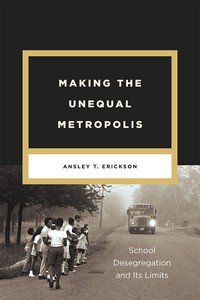
Many historians, however, still know little or nothing about sociobiology, evolutionary biology, or evolutionary psychology. I have recently learned this the hard way.
Some months ago, the American Historical Review (AHR) invited me to write a review of a new book, Making the Unequal Metropolis, by Ansley T. Erickson an Assistant Professor of history and education at Teachers College, Columbia University. I began the review by stating that Professor Erickson deserved “high praise for the depth of her research,” but I “demur[red]” when it came to her argument.
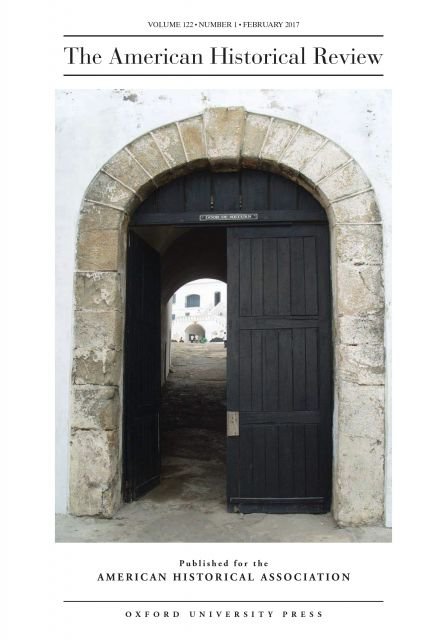
I then summarized one of Professor Erickson’s main points (that the Supreme Court erred in the 1990s and in 2007 when the Court turned away from the court-ordered metropolitan busing for racial balance that an earlier Supreme Court had ordered in decisions handed down between 1968 and 1973). I explained why I did not agree with Professor Erickson and then, in the final sentence of my review, I wrote, “Like most historians and social scientists, Professor Erickson says nothing about sociobiology.” [Read the review: PDF]
This sentence was a declarative statement of fact, but one that contained the implication that Professor Erickson’s book would have been better if it had been informed by an acquaintance with recent science and scholarship on evolutionary biology, psychology, and anthropology.
The Interim Editor of the AHR, Professor Robert A. Schneider has acknowledged that he “linger[ed] over that last sentence.” [ The Wrong Reviewer | Leading history journal apologizes for assigning review of book on inequality and urban education issues to a professor viewed by many as a white supremacist, By Scott Jaschik, Inside Higher Ed, April 18, 2017].
One of his assistants wrote and asked me, “Could you explain what you mean by sociobiology? What indeed, today, is sociobiology?”
I was surprised. The controversy over sociobiology had been widely publicized in the 1970s, with some journalists calling the controversy the academic debate of the decade. I was taken aback to discover that that the Interim Editor and his staff apparently knew nothing of it.
“’Sociobiology,’” I answered,
is an approach that focuses on the way biology influences social behavior. The pioneering work in this field is Sociobiology: The New Synthesis … by the naturalist and biologist E. O. Wilson. This field focuses on the way biology (including genetic adaptations to evolution in different environments) affects the social behavior of humans and other living beings.
My answer seemed to satisfy the Interim Editor. There were no more questions, and the AHR published my review of Professor Erickson’s book in its issue for February 2017.
After the AHR published my review of Professor Erickson’s book, a small group of historians exchanged e-mails and text messages and then wrote letters of complaint to the AHR. The general theme, mentioned in all the published letters, took exception to my mentioning “sociobiology.”
It is “a term that has no standing in our field or any of the social sciences,” one writer declared. Others dismissed “sociobiology” as merely a “theory,” as a doctrine of “white racial supremacy,” as a “twenty-first century version of scientific racism.” [Natalia Petrzela (email her) New School]
These statements are false.
One complainant [Andrew Kahrl Carter G. Woodson Institute] admitted that he had “no idea” what “sociobiology” meant. So he read some of my essays and discovered that I had written that “people of different continental ancestries differ statistically in the distribution of some important aptitudes”; that “different groups had developed different aptitudes that were suited to their respective environments.”
True. I have written that, and I stand by it. I think it is a mistake to think that each of the major population groups has the same distribution of predispositions, proclivities, and aptitudes, regardless of whether the group evolved in cold climates or the tropics, regardless of whether their long line of ancestors were hunter-gatherers, settled farmers, merchants, or bankers.
If Charles Darwin established anything, it is that natural selection gives an edge in the struggle for survival to those who have adapted to their particular environments. I think most historians would do better if, instead of propounding the false idea that racial differences are only skin deep, they recognized the reality of natural selection — while also noting that there is a great range of aptitudes within each group and that each individual person should be treated decently, whatever his or her capabilities.
Of course history has taught us to be skeptical of racial theories. But that is not an excuse for my critics’ insistence that sociobiology is so far beyond the pale that it should not be mentioned in the pages of the American Historical Review at all. This amounts to a denial of science. It is an example of what anthropologist Gregory Cochran had in mind when he wrote that a person would have to be an “idiot” to think that
the optimum mental phenotype … [is] the same in tropical hunter-gatherers, arctic hunter-gatherers, Neolithic peasants, and medieval moneylenders … Natural selection must have generated significant differences between populations; differences whose consequences we see every day, and that have been copiously documented by psychometricians.
[Pygmification, West Hunter, August 24, 2014]
But in my review of Professor Erickson’s book, however, all I did was mention that Professor Erickson (“like most other historians and social scientists”) did not say anything about sociobiology.
My critics also complained about the company I keep. One found fault with me for granting “a personal interview to a website called VDARE.com, which the Southern Poverty Law Center has classified as a ‘white nationalist hate website.’” This critic [Zoe Burkholder, (Email her) Montclair State University] also took exception to my having published essays in what she called “the shadier corners of the Internet.”
But this critic did not identify the publications or mention any specifics about what I wrote or said. [Communications, American Historical Review, April 2017, PDF]
The Interim Editor of the AHR acknowledged that I had “a fairly long and solid publication record … in credible scholarly venues [seven books and many articles and reviews in academic publications].” But the Interim Editor also said he would have pulled my review of Ansley Erickson’s book if he had known about some of my recent publications — presumably opinion essays I wrote for VDARE.com and AmRen.com and a talk I gave to the H. L. Mencken Club.
The Interim Editor did not mention any specific statements or comments that he found offensive. But he implied that my association with these groups was enough to “discredit [me] as a legitimate scholar.”
This took me by surprise, for these organizations are headed by distinguished men — Peter Brimelow, Jared Taylor, and Paul Gottfried.
This incident may have begun as an instance of hyper-sensitive academics defending a like-minded friend from slight criticism. But some of my critics’ comments, and especially the comments of the Interim Editor of the AHR, amount to an effort to censor discourse. The Interim Editor is warning historians to beware, lest they be defenestrated for even mentioning the connection between evolution and race.
As I say, this has been developing for a while. Writing in the AHR a decade ago, historian Michelle Brattain observed “Historians have come to the consensus that race is a social construction, but … many people outside the humanities have not.” Professor Brattain then recommended that historians try to discredit sociobiology by “problematizing” or “historicizing” both race and science.
Nevertheless, sociobiology has not gone away — far from it. As historian Marshall Poe noted in 2009, DNA researchers are no longer “talking about skin, eye, or hair color.” They are “talking about intelligence, temperament, and a host of other traits.” They are saying, “The races … are differently abled in ways that really matter.”
Rank-and-file professionals and many ordinary citizens are recognizing this. We are living at a time when doctors can be censured, even fired, if they do not take race into account when prescribing certain drugs.[I Am a Racially Profiling Doctor By Sally Satel, NYT, May 5, 2002] Nowadays pulmonary and other medical devices have different settings for people of different continental ancestries; and more and more people are getting in touch with Ancestry.com and 23 and me.
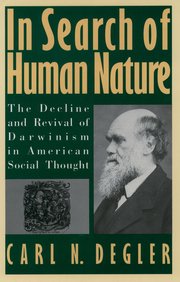
The trend is so strong that even some historians have broken away from the Standard Social Science Model — the belief that human behavior is shaped by history and culture, but not by evolution and heredity. An important example: Carl Degler (1921-2014), a Pulitzer Prize-winning historian at Stanford and at different times the President of the American Historical Association, the Organization of American Historians, and the Southern Historical Association. In an important book of 1991, In Search of Human Nature, Degler reviewed a large body of scientific research and showed that in the debate over the relative importance of nature and nurture, the pendulum has shifted from stressing the importance of nurture in the 1930s, 1940s, and 1950s to emphasizing the importance of nature and evolution in recent decades.
But many historians — probably most members of the guild — still believe that race is entirely or primarily a social construct. They persist in dismissing sociobiology — as when Professor Dorothy Ross reviewed Carl Degler’s book for the American Historical Review.
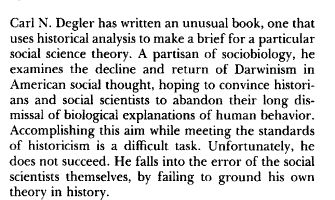
Professor Ross began by noting that Degler was “a partisan of sociobiology” and was trying “to convince historians and social scientists to abandon their long dismissal of biological explanations of human behavior.” She then proceeded to employ “historicism” to discredit Degler: She said Degler was mistaken because he had made “the error of … failing to ground his own theory in history.” Had Degler historicized the rise, decline, and revival of Darwinism, Professor Ross wrote, he would have recognized that Darwinism came into vogue in America as a rationale for inequality during the Age of Big Business; that it fell from fashion during the more egalitarian era when Progressivism and the New Deal held sway; and that the revival of Darwinism has occurred in an allegedly conservative era that has stretched from President Eisenhower to President Reagan and beyond.
But Degler had anticipated and answered this criticism in his book. He did so by repeatedly noting that many of the scientists who emphasized the role of biology in human behavior were “personally liberal, rather than conservative, in political outlook.” Degler did not think sociobiologists were trying to “to preserve and strengthen the dominant political and economic interests.” He thought they were seeking (and in fact had discovered) the truth. And he thought this outweighed the possibility that somehow sociobiology would take the United States back toward the unfair racial discrimination that prevailed in the years before the Civil Rights Movement.
Times change. In 1992 Carl Degler was unfairly criticized for not “historicizing” and “problematizing” sociobiology. In 2017, I have been condemned for merely mentioning the word sociobiology in a book review!
What is going on? It’s complicated. But this much is clear. When it comes to resisting the unwarranted demands of academic liberals and radicals, ignorance and pusillanimity have recently prevailed on many college campuses and also, I think, in the editorial office of the American Historical Review.

In retrospect, the 1980s and 1990s seem like a halcyon era, a time when social problems could be discussed realistically. Those were years when major commercial presses published three landmark books that candidly departed from the familiar liberal line: Jared Taylor’s book on race relations, Paved with Good Intentions (1992); Richard Herrnstein and Charles Murray’s book on intelligence, The Bell Curve (1994); Peter Brimelow’s book on immigration, Alien Nation (1995). It was also a time when I could find a university press that would publish my account of school desegregation, The Burden of Brown(1984), with its emphasis on the vagaries of federal judges and the misbehavior of black students. It was a time when the American Bar Association chose that book for its major book award for 1985, the Silver Gavel Award.
Those books would not appear now. Charles Murray is still publishing best-sellers, albeit not mentioning heredity or immigration, but he cannot speak at a college campus without precipitating an uproar. Peter Brimelow and Jared Taylor are still writing, but at their own webzines — neither have been able to publish sequels to their 1990s books with mainstream presses.
And now I have been banished from the American Historical Review, where I had previously published on ten different occasions. Six months ago, the Interim Editor was not even familiar with the word sociobiology. But after he received a few letters complaining about my use of the word, he effectively decreed that, if scholars wish to discuss racial matters in the AHR, they should not suggest that evolution may be responsible for some well-documented disparities.
Why has this come to pass?
One of the long-term effects of World War II and the triumph of the Civil Rights Movement was something often called “tolerance education.” And that has led to indoctrination that favors immigrants and non-whites while casting aspersions on Caucasians and on Darwinism — not in biology classes but in social studies.
Students have been told that the different races of humanity have the same distribution of aptitudes. And students who question this message have come to understand that, if they are to get ahead in many fields, they must submit to Politically Correct explanations of ethnic and racial disparities. They must affirm that Mother Nature is not responsible for these disparities; that group inequalities are due to discrimination or privilege, or in some cases to the accidents of history and culture. But never to Natural Selection.
We are living in a new Dark Age, Scholars are expected to stay away from sociobiology, not because E. O. Wilson and Carl Degler were mistaken but because modern egalitarians are reacting badly to a challenge similar to the one that evolution once posed for Christian fundamentalists. At first, most Christians denounced Darwin’s theory of evolution as, in the words of William Jennings Bryan, jeopardizing “the doctrine of brotherhood,” undermining “the sympathetic activities of a civilized society,” and “paralyzing the hope of reform.” And now sociobiology is under attack by Social Justice Warriors who are concerned about the implications that racial genetics may have for racial policies.
I do not wish to minimize the sensitivity of this situation. There may be good reasons for public leaders to avoid discussion of sociobiology. A recently released tape recording of a 1971 conversation reveals that President Richard Nixon and his advisor, Daniel Patrick Moynihan, understood the implications of evolution but nevertheless insisted that it was not their responsibility to disseminate this knowledge.
But the obligations of scientists and scholars (and journalists) differ from those of politicians. Academics should pursue the truth. They should not conspire to suppress it — not by “historicizing,” not by “problematizing,” not by any means at all.
Whatever the implications for social policy may be, it will never do for scholars, for reasons of expedience, to lie to the world as Galileo once lied when his mind held the truth.
Raymond Wolters is the Thomas Muncy Keith Professor of History, Emeritus, at the University of Delaware.